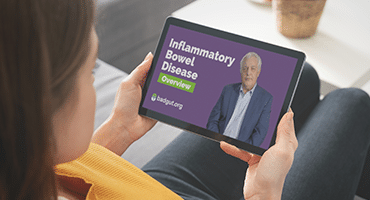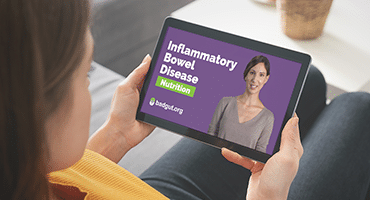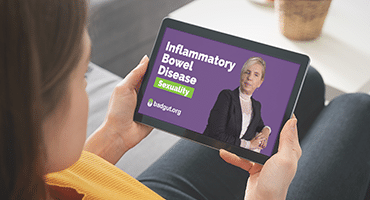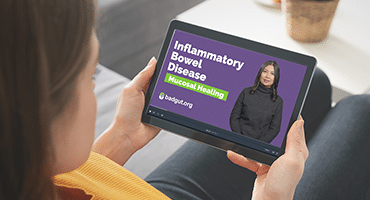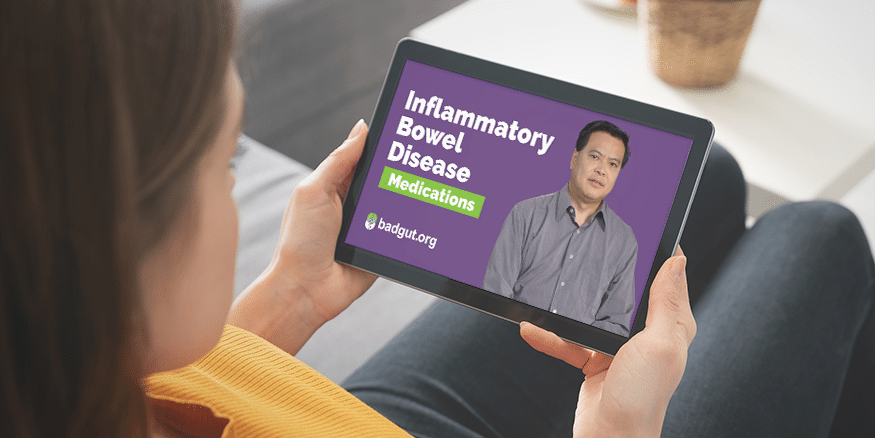
Medications for IBD (Crohn’s and Colitis) Video
Featuring
Alan Low, BSc. (Pharm.), Pharm. D., RPh, ACPR, FCSHP, CCD
Clinical Associate Professor, Faculty of Pharmaceutical Sciences, UBC
Primary Care Pharmacist and Pharmacy Lead, BioPro Biologics Pharmacy
biopropharmacy.ca
Video Transcript
If you have inflammatory bowel disease, often shortened as IBD, you might feel a bit overwhelmed about all the different treatment options available. You have probably heard of many different medications, diets, and surgeries. In this video, I’m going to go over some of the different medications, how they work, and why they might be prescribed.
When using medications to treat IBD, which includes Crohn’s disease and ulcerative colitis, we focus on two main strategies: managing symptoms directly and reducing disease activity in order to limit future symptoms.
Symptoms and their impact on health and wellbeing are the most distressing component of the disease, and direct treatment of these, particularly chronic pain and diarrhea, will improve the quality of your life.
To reduce pain, we use analgesic medications. Acetaminophen, also known as Tylenol®, is the ideal over-the-counter choice. Non-steroidal anti-inflammatory drugs, or NSAIDs, such as acetylsalicylic acid, ibuprofen, and naproxen, are effective at relieving pain but can irritate the gut, so use these cautiously.
To manage diarrhea without treating the underlying cause, you might use antidiarrheals that slow down the transit time of food in the intestines, or antispasmodic agents that improve cramping associated with diarrhea. Fibre supplements help adjust stool looseness and frequency by binding to water. By modifying its consistency, it may be easier for you to pass the stool.
While medications that ease symptoms are helpful, the primary goal of treatment for IBD is to stop inflammation in the gastrointestinal tract and halt disease activity.
Treating the cause often eliminates the symptoms entirely and is preferred over simply treating the symptoms as they appear.
Remission is when your disease is managed, and the goal is to use medications to stay in this state for as long as possible.
Your physician might prescribe any of the following medications, perhaps individually or in combination. It could take some time to find the right mix for you, as each case of IBD is unique.
Depending on the location of your disease, different drug delivery methods, such as oral, rectal, or a combination can help to ensure that all areas of active disease are treated.
5-ASA, or 5-aminsalycilic acid is a medication used to reduce inflammation in mild to moderate IBD. It has a long record of success.
5-ASA is generally safe and well tolerated for long-term use. The most common forms of these drugs are coated oral tablets and capsules, but it is also available for rectal administration, in the forms of enemas or suppositories.
Sometimes sulfasalazine is used, which is a chemical combination of 5-ASA and sulpha. However, it’s not for you if you have a sulpha allergy.
5-ASA, also known as mesalamine, helps to settle acute inflammation and, when taken on a long-term basis, which we call maintenance, is effective in keeping inflammation under control.
It is important to maintain your medicine regimen even if you are symptom-free and you feel completely well.
Maintenance therapy can be at the full initial dosage or at a reduced dosage and interval, depending on the disease response. If you stop taking your medications, symptoms can return quickly, and it may be more difficult to regain control compared to continued maintenance regimens.
Your doctor might prescribe corticosteroids, such as prednisone, used orally, and budesonide, available for oral and rectal administration, to reduce inflammation in the shorter-term.
Another corticosteroid, hydrocortisone, is available in rectal formulations, including enemas, foams, and suppositories. Corticosteroids are effective at reducing inflammation, but they aren’t great for long-term use because they can have many unpleasant side effects and health consequences, such as weight gain, osteoporosis, glaucoma, hypertension, puffy face, cataracts, acne, and altered moods.
Physicians sometimes prescribe corticosteroids for administration intravenously in-hospital for more severe cases or for a faster response. Corticosteroids should not be used long-term or for maintenance therapy. Slow tapering off these medications is necessary after prolonged use of high doses.
Most physicians prescribe oral versions of 5-ASAs or corticosteroids since patients prefer taking pills. However, even if these medicines have a specially designed release mechanism, they might not reach and treat the area where the disease is most active.
Oral tablets, even with a coating to help the drug release at the active inflammation site, might not be the optimal way to reach the end of the colon, where stool can interfere with its effectiveness. Unfortunately, this is also the area in the colon where a flare usually starts. The best way to reach this area is by delivering the drug into the rectum.
To get the best coverage of topical rectal therapies, it is best to lie down on your left side. The human anatomy is not symmetrical and the way the organs lay when on the left side makes for better passage and flow of medication through the anus, rectum, and into the colon.
A suppository will travel into the rectum and usually reach about 15 centimetres inside from the anus. An enema, in liquid form or foam, will reach farther, about 60 centimetres.
It is best to insert these formulations before bedtime, to ensure that the medication is retained as long as possible. Stool does not usually interfere with the drug, since the bowel area is typically relatively empty right before bed.
Rectal preparations are particularly good at treating urgency and bleeding, which are bothersome symptoms. A positive response often occurs within days of treatment.
Immunomodulating drugs can help prevent flares and reduce dependence on corticosteroids, such as azathioprine, cyclosporine, 6-MP, methotrexate, or a newer medication called tofacitinib, depending on specific circumstances. These can take up to twelve weeks of therapy to start working and six months to be fully effective.
While these are used to reduce dependence on steroids, recent literature does not show effectiveness when used alone. With these drugs, there can be an increased risk of some infections and adverse effects. So regular blood tests will be required.
The newest category of medications to treat IBD are biologics. These products are specially developed proteins, created with living cells, which selectively block mediators that are involved in the inflammatory process.
Gastroenterologists routinely prescribe biologics, to induce clinical remission of inflammatory bowel disease. Biologics are highly effective, and they tend to work where other medications fail. Some are self-administered under the skin every two to twelve weeks and others require a healthcare professional to administer them through intravenous infusion approximately every eight weeks.
Initial treatment may require more frequent infusions.
Broad-spectrum antibiotics such as metronidazole and ciprofloxacin are important for treating secondary problems of the disease, such as peri-anal abscess and fistulae in Crohn’s disease.
Even though the treatment goal is to maintain remission, sometimes you might experience a sudden onset of symptoms, which is called a flare. It is important to discuss with your physician in advance exactly what you should do if the disease flares.
Having this important conversation with your healthcare team means that you can prepare for some immediate self-management when necessary, while keeping everyone aware of your condition.
However, if you have severe symptoms you should seek help immediately, even if that means heading to the hospital emergency room.
It is necessary to treat a flare early. Inflammation typically does not resolve without treatment and early intervention results in a better outcome than waiting.
Delaying treatment may limit the options available to your healthcare team, and you’ll experience symptoms longer before getting relief.
Living with constant or longer periods of inflammation might also increase your risk for future complications, as inflammation may cause damage to the gut wall, which accumulates in severity with each flare.
Individuals with IBD may be anemic from a combination of factors, such as chronic blood loss or malabsorption of certain vitamins and minerals. Iron supplements might help improve this condition, but if you don’t respond to pills, then injectable iron by infusion is available.
If signs of IBD occur outside of the gastrointestinal tract, such as arthritis or inflamed eyes, your physician will address these conditions individually, and you might require referrals to other specialists.
While there is currently no known cure for IBD, it is a highly treatable condition. With the right medications, working with your healthcare team, along with dietary and lifestyle changes, you can live a long, healthy life.

